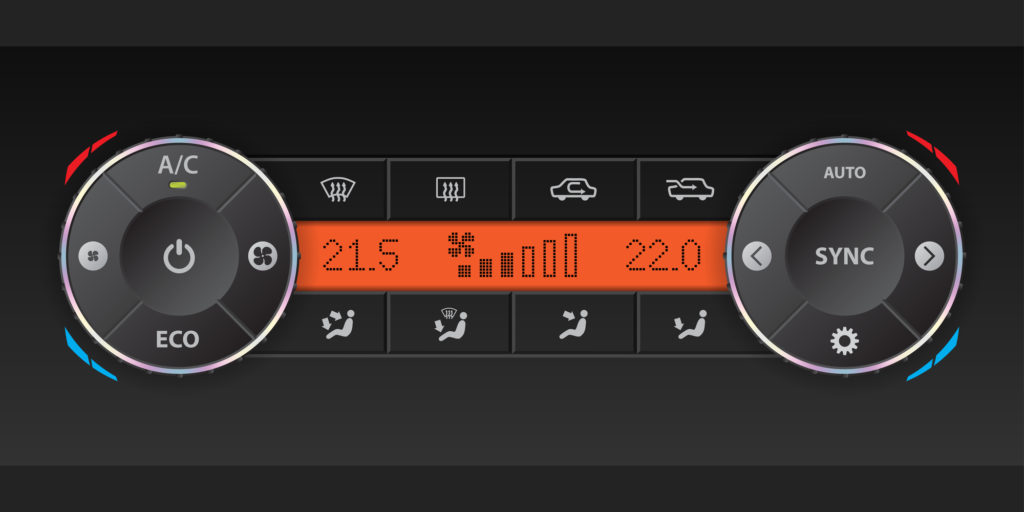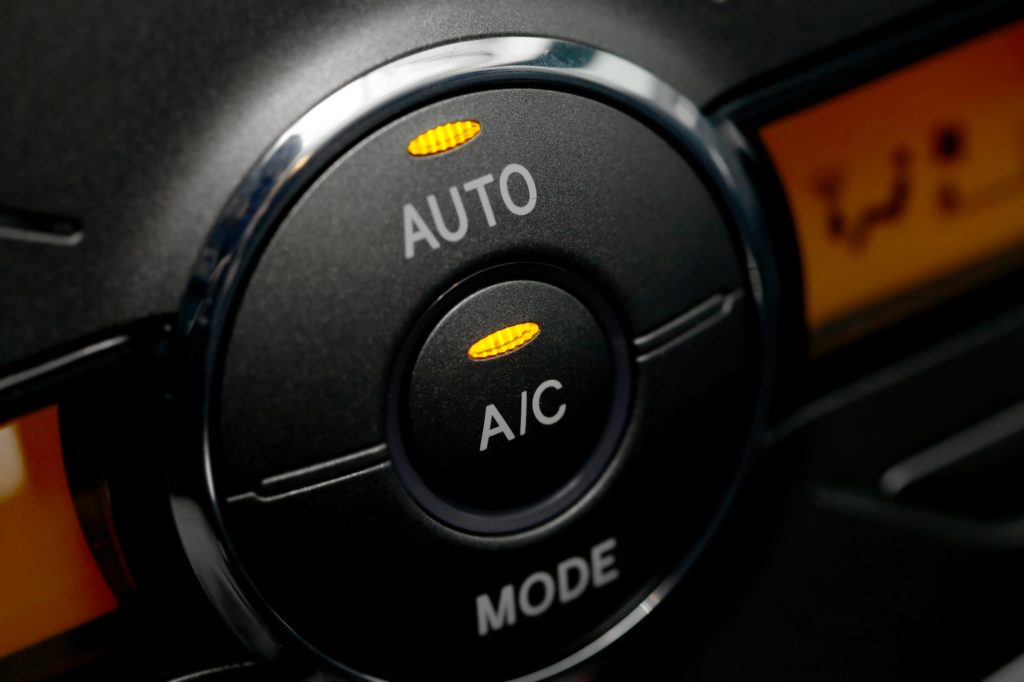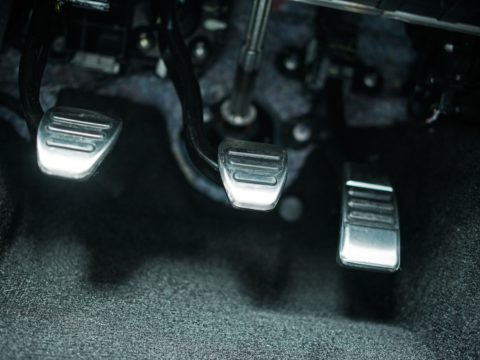As a driver, it’s hard to imagine much worse than being stuck on a long drive on a hot day and not being able to use your air conditioner.
A car overheating when AC is on is a problem that perplexes many drivers, and not only can it make driving uncomfortable, but it can result in your car engine overheating and do lasting damage to your vehicle.
In this article, we’re going to discuss the potential reasons why your engine overheats when the air conditioning system is on, the symptoms of a faulty AC compressor, and how you can fix this problem.

Contents
What Causes Overheating When AC Is On?
If your car overheats when AC is on, there are a number of defective components that could be causing the problem.
Malfunctioning AC compressor
An AC compressor overload will put a lot of extra pressure on the engine that it won’t be able to handle and might be the reason your car overheats when AC is on.
When working properly, the compressor shares the load of powering of the air conditioner with the engine. When it isn’t working properly it places a lot of extra stress on the engine, leading to overheating.
Ineffective Cooling System
The car cooling system is responsible for keeping the air conditioner condenser cool while the air conditioner is switched on.
When it fails, it means your car engine will overheat when the AC is on.
A defective coolant system can occur when the condenser tubes are clogged, if the cooling system’s fan is defective or if a faulty water pump is not circulating coolant effectively.
An incompetent coolant system can cause lasting damage to your car, and it is important to diagnose and address it as soon as possible.
Faulty engine coolant temperature sensor
A defective engine coolant sensor is a less likely culprit of a car overheating but not an impossible one.
The car’s cooling fans pump cool air into the engine coolant and are triggered by the electronically controlled temperature sensor. If they are malfunctioning, they won’t trip the fan, causing a rise in the coolant temperature, which can lead to the car overheating.
Failing AC compressor
An AC compressor functions as a pump that drives coolant fluid through the car’s cooling system.
In the event of a worn compressor, the coolant passing through the system will not be cooled, placing the car engine under a lot of extra stress whenever the AC is on.
If the compressor is unable to handle the extra load of the AC being on and has to pump coolant, the engine will have to carry a significantly higher amount of stress whenever the AC is on.
You’ll notice this issue when the AC begins to pump hot air into the car instead of cold. If it’s failing to cool the coolant system properly, you may also smell burning when your AC is on.
Issues with radiator
A radiator helps pass coolant into your car’s engine. As the coolant passes through the fins of the radiator, it assists in the proper running of the car.
So if the fins become blocked, the clogged radiator will stop functioning correctly. Anything could block the fan; your car might’ve sucked in a plastic bag that’s disrupting the airflow.
Over time moisture can corrode the radiator fins, which will negatively affect its ability to exchange heat. Once this happens to the radiator, it can permanently damage the car’s cooling system and will require a replacement.
AC Compressor Overheating Symptoms
The hassle of a malfunctioning AC system coupled with your car overheating can be stressful.
Luckily diagnosing an overheating compressor is fairly simple if you look out for these tell-tale symptoms.
Noise From Air Conditioner Compressor
When the compressor’s clutch is active, the internal components of the pump are under a lot of pressure to keep the system running.
Once this wear builds up, you will notice a grinding noise whenever your AC is on. If this noise stops once you switch the AC off, that’s a clear indication that your compressor’s components are faulty and will need replacing.
AC System Blowing Warm Air
This is a common result of a failing compressor and is usually the earliest sign that your compressor is failing.
If your car’s compressor is unable to effectively compress the coolant in your car’s cooling system, the cooling coils will not cool and, in fact, will heat up considerably. This means an AC system pumping hot air, and could be the reason your car overheats when AC is on.
Compressor Clutch Not Moving
In some cases, it’s not the whole AC condenser that has stopped working but a single component in it.
The compressor clutch spins the inner pulley of the compressor, starting its cooling process. If the clutch fails, the car’s cooling system will not engage properly and can lead to your car overheating.
Burning Rubber Smell
A drive belt supplies power to several parts of the vehicle, including the AC.
Over time the drive belt can become worn down or start to melt. In this case, you would be able to smell burner rubber coming from your car’s AC when it’s switched on.
Coolant Leakage
If your compressor starts to over-compress coolant due to an internal fault, the excessive pressure and heat can cause its seals to burst. This results in coolant leakage, stopping your AC from cooling properly.
This can be difficult to diagnose in some cases as the leaks may be internal.

How to Fix an Overheating Car
Depending on the source of the problem, taking your car to the shop to be fixed can be a costly choice, especially if you need a replacement compressor.
Don’t jump the gun, though; other components may be the reason your car overheats when AC is on that you can diagnose and remedy yourself.
Flush the Coolant System
Regularly checking your car’s coolant system is good practice even before your car shows symptoms of overheating.
The build-up of sediment and sludge in the hoses and drains can cause lasting harm to your car air conditioning system. An approved solvent can clear these undesirable elements from the coolant mixture.
Clean the Radiator
The radiator is an integral part of your car’s air conditioner, and a simple blockage could be the reason your car overheats when AC is on.
The simplicity of the functionality of the radiator means it can be easily compromised, and due to it being an integral part of keeping your car’s engine cool, it should be addressed as soon as possible.
A blockage can prevent the continual exchange of coolant and water. Checking and clearing the radiator fins of a large blockage or a build-up of sediment can be a quick solution. You may also need to inspect the radiator’s internal pipes.
Add Water/Antifreeze to the Radiator
Adequate water and antifreeze levels are required for the car radiator to function properly. If it isn’t kept cool enough, it will heat up and add stressful rotational load to the engine of your car.
Topping up low water and coolant levels in the radiator keeps it cool, preventing the heat build-up, which can lead to hot spots building up in your engine. This can do lasting damage to the engine, including swelling and distorting of engine components.
Several issues can have a knock-on effect on the car radiator but ensuring adequate levels of coolant and water in your radiator is good practice to avoid future long-term problems.
Service the Air Conditioner
In some instances, the source of the issue when your car overheats can be too difficult to self-diagnose, relating to an intricate part of the coolant, system’s inner working. Perhaps you lack the adequate tools to check the inside of the radiator pipes, replace a drive belt, or are unable to detect a coolant leak.
If your best efforts fail to locate the issue, taking your car to the shop will ensure a professional will be able to accurately diagnose the issue and advise and perform the solution.
Can a Bad AC Compressor Cause a Car to Stall?
The AC creates friction to run the compressor in your car. If your compressor is frozen, the dramatic rise in engine temperature may not only mean that your car overheats but cause your engine to stall.
So yes, in some cases, the temperature in the engine compartment can cause the sudden death of the engine.
How Much Will It Cost to Fix a Bad AC Compressor?
The scale of the repair will greatly vary the cost of the repair.
Some component repairs can cost as little as $125-$450, while general repairs can cost $150-$550. If a full-scale repair is needed, it can exceed $1000. If this is the case, it may be worth considering a new unit which can cost between $1000-$2500.














